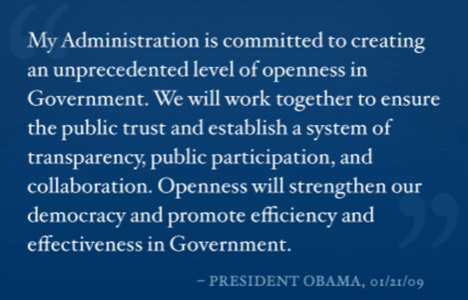We noted last year, that many believe U.S. President Obama’s push for governmental transparency has been a failure. Whether that’s true, the overall tendency toward access continues to gather momentum.

The U.S. House of Representatives has announced a public hearing to explore making publicly-funded research open to the public. Legislators in both the House and the Senate have already introduced bills calling for this. If they pass, the implications could be significant and might result in an economic jump.
The House Committee on Oversight’s Subcommittee on Information Policy will convene the hearing for Thursday, July 29 at 2:00 PM in Room 2154 of the Rayburn House Office Building in D.C. The hearing will allow the Representatives on the Committee to hear input from a variety of stakeholders.
Rep. Mike Doyle (R-PA) introduced the Federal Research Public Access Act into the House on April 15. An identical Senate version of the bill was introduced by Senator Joe Lieberman (I-CT) and Senator John Cornyn (R-TX). Bi-partisan support for public access to federal research has been growing.
The bills propose specifically that the 11 federal agencies with research budgets of $100 million or greater make the published results of their research free to the public.
Knowledge is (Economic) Power
If these 11 massive agencies suddenly were required to make their research public (with a governmental value of suddenly), it could possibly act as a shot of adrenaline to the private sector. Who knows what products and services might be launched, or improved, on the back of this research? It could result in a significant leap forward for an economy that seems at times terminally stalled.

Presumably, the government already has the research that they’ve paid for. (Presumably.) But a public in possession of that information might make for a much less patient public. If a government agency, for instance, knows something that could improve its services, but allows bureaucratic foot-dragging or inter-agency squabbling to slow its implementation, that agency would find itself in, let’s say, a compromised position politically when an informed public realized what it was doing.
Having been in a position to listen and talk to career bureaucrats facing change, we are not as sanguine as we could be at the news. It would be surprising indeed if half the people responsible for sharing this information with the pubic didn’t go limp at the first approach of torch-wielding villagers at their castle door. To work, this bill will require that the chief executive make it known in no uncertain terms that any agency head with a hitch in his gitalong will shortly thereafter find himself on the street in the company of all his closest advisors.

















